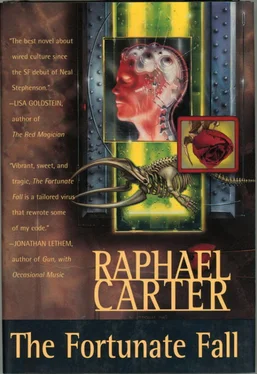Raphael Carter - The Fortunate Fall
Здесь есть возможность читать онлайн «Raphael Carter - The Fortunate Fall» весь текст электронной книги совершенно бесплатно (целиком полную версию без сокращений). В некоторых случаях можно слушать аудио, скачать через торрент в формате fb2 и присутствует краткое содержание. Город: New York, Год выпуска: 1996, ISBN: 1996, Издательство: Tor Books, Жанр: Киберпанк, на английском языке. Описание произведения, (предисловие) а так же отзывы посетителей доступны на портале библиотеки ЛибКат.
- Название:The Fortunate Fall
- Автор:
- Издательство:Tor Books
- Жанр:
- Год:1996
- Город:New York
- ISBN:0-312-86034-X
- Рейтинг книги:3 / 5. Голосов: 1
-
Избранное:Добавить в избранное
- Отзывы:
-
Ваша оценка:
- 60
- 1
- 2
- 3
- 4
- 5
The Fortunate Fall: краткое содержание, описание и аннотация
Предлагаем к чтению аннотацию, описание, краткое содержание или предисловие (зависит от того, что написал сам автор книги «The Fortunate Fall»). Если вы не нашли необходимую информацию о книге — напишите в комментариях, мы постараемся отыскать её.
“Gripping…. One of the most promising SF debuts in recent years”.
—“Publisher’s Weekly” starred review
The Fortunate Fall — читать онлайн бесплатно полную книгу (весь текст) целиком
Ниже представлен текст книги, разбитый по страницам. Система сохранения места последней прочитанной страницы, позволяет с удобством читать онлайн бесплатно книгу «The Fortunate Fall», без необходимости каждый раз заново искать на чём Вы остановились. Поставьте закладку, и сможете в любой момент перейти на страницу, на которой закончили чтение.
Интервал:
Закладка:
“Will that work?” I whispered.
“Speak freely; no one can hear us now. And yes, it should. You’re between me and the closest spy satellite; the other one’s too far to see much. Back to where you were before, please.” He put on the new plate, then moved back to the other car and laid his hands on it. Its dashboard lit up, except for the security section, which remained dark. “All right, friend,” he murmured to the car, bending down to press his cheek against its hood, “who do we belong to? Ah, registered to Maria Petrova and Ivan Petrov, a man and a woman… and they’re both here. Perfect. That makes everything much easier.” He straightened back up and brought one hand to his head. I heard the car’s phone begin to dial itself.
On the second ring someone picked up the phone. “Petrova.”
“Maria Petrova,” he said in a creditable imitation of an early-model Kruchonykh voice, “this is an automated call from your Kruchonykh KL-37. There has been an attempt to steal me. I have already electrocuted the offenders and alerted the appropriate authorities. Please proceed to my vicinity as soon as possible to fill out the police report.”
“Bozhe moy —how many were there? Are they alive?”
“The hooligan or hooligans are dead. No further information is available at this time. Thank you for choosing Kruchonykh.” The phone went dark. He turned to me and said: “That ought to do it. The promise of carnage rarely fails to bring people running.”
“Won’t they just call the cops and draw attention?”
“It doesn’t matter if they do or not; the cops already know we’re here.” He touched the car again and its motor started. “The satellites have infrared, so their motor has to be about as warm as ours. The Postcops will figure they started it remotely, if they notice at all. —You were asking about my checkered past.”
“‘Conspiracy to overthrow the government’?”
“Oh yes, that. A youthful folly. That was when I thought that liberty in the Fusion was being destroyed by people, and not by impersonal forces. I tried to embarrass a few of those people. But I discovered that in the Historical Nations you will never run out of tyrants. Depose all you want, they’ll make more. By the time I realized who my targets should have been, I had become much too old for such antics. ‘If youth knew, if age could.’”
“If you don’t mind my saying so, you look as though your age can.”
“Aesculapius and Hephaestus have been kind to me,” he said, “but there are limits.”
“He means medicine and technology, the pretentious old bat,” Keishi put in, before I could ask.
I was about to ask another question when he said: “Don’t look now, but here come the Petrovs, every petty-bourgeois inch of them. Now, the satellite takes pictures at a rate of one every four seconds, so when they’re four seconds away from the car—say, when they reach the bumper on that Honda there—get in as fast as you can. Ready?” He adjusted the side mirror as the couple approached. Then at the appointed moment we both jumped in.
“Look,” he whispered, pointing to the side mirror. “They’re standing by the car and talking. They’re us, and we’re them. He’s even wearing a sweater, so he’ll only be a little brighter than me in infrared. We’ve done it.”
Maria Petrova noticed us and rapped at the window. I rolled it down.
“Excuse me, tavarishcha. Did you see anyone near this car?”
“No,” I said, “but we heard the alarm call you. It must be on the fritz.”
“Those Kruchonykh alarms are crap,” Voskresenye said in a crotchety old man’s voice. “They’ll do that every time. It’s a miracle we weren’t electrocuted. Just you trade that pile of garbage in on a Stepanova. You mark my words.”
I rolled my eyes. “Oh, Sergei.” To Maria Petrova I said, “Sergei is an engineer for Stepanova. He gets like this.”
She looked back and forth between us, seeing the difference in ages—then decided to smile. “I understand. You should hear Ivan on the evils of Japanese software.”
Having affirmed my membership in the international sorority of suffering spouses, I realized, I could now drive away without arousing comment. “Sergei, let’s go home and quit bothering these nice people,” I said, and to Petrova: “ Proshaite, sestra. ”
As I backed out I heard Ivan say, “But she’s driving a Kruchonykh!”
“Of course I am!” I called out the window. “I’m not stupid enough to drive anything my husband designed!”
Voskresenye chuckled as we drove away. “Most impressive. You missed your calling. You should have been an actor.”
“I am,” I said. “Or at least, I was until today. Are we clean now?”
“Once more for good measure. Stop anywhere along here.”
I did, and he switched the license plate again, this time with a small green convertible that he said was between sensors.
“Now we’re clean. By the time anyone figures out what happened, we’ll be miles away, and they’ll be tracking the wrong vehicle.”
“And Maria Petrova drinks tea?”
“No. At the most, a Postcop asks some questions and they get an extra dose of surveillance for a while; nothing worse. Even if we were being watched, which we may not have been.”
“And meanwhile, I sink deeper and deeper.”
“Not at all. As of six o’clock, that’s always been your plate number. I have already set up the logic bomb.”
“He’s telling the truth. I saw him do it,” Keishi said with grudging admiration. “Under all that rusting hardware, the man’s got street.”
I looked toward Voskresenye, and then around at the spot just behind me where I always imagine the screener standing, and shook my head. “So are we clean enough to make it out into the countryside, to someplace unsurveilled?”
“We’re clean enough, but that’s the wrong place to go. It’s too obvious, and a plate search on cars leaving the city wouldn’t take them long. What we need is a place within the city where we can be certain we’re unobserved.”
Keishi’s voice rasped from the car speaker: “Like a nice big semistable bubble right on Nevsky Prospect?”
“Exactly,” Voskresenye said, nodding.
“What’s a bubble?” I asked.
“A temporary surveillance-free zone. Head back downtown, if you please. Park us anywhere off Nevsky, and we’ll walk.”
“Why do you want to go back to Nevsky? Isn’t that the first place they’ll look?”
“Who would expect us to circle back to the place where we were first identified?”
“Anyone with an ounce of imagination,” I said. “Anyone who’s ever read an American detective novel.”
He nodded. “You mean, anyone but a Postcop. Besides, they can look all they want; they won’t find us.”
I looked at him skeptically. “And what good does this bubble do us?”
“It gives you a chance to interview me.”
“Are you putting me on?” I glanced from the road to his face, which was unreadable. “You think I’m not in deep enough tea already, I should try Netcasting the life and times of a wanted criminal?”
“We can limit our discussion to the Calinshchina,” he said. “Your screener can alter my features, and elide any mention of my so-called terrorist activities.”
I thought for a moment. Keishi, can you make this ’cast clean? I mean a hundred percent, no traces whatsoever?
“In my sleep, girl.”
I decided that if she could make the Postcops forget about me, she could give me a clean Netcast; and if she couldn’t, then it wouldn’t matter. I might as well go ahead and get the story I was risking my career for. Besides, I was curious.
Читать дальшеИнтервал:
Закладка:
Похожие книги на «The Fortunate Fall»
Представляем Вашему вниманию похожие книги на «The Fortunate Fall» списком для выбора. Мы отобрали схожую по названию и смыслу литературу в надежде предоставить читателям больше вариантов отыскать новые, интересные, ещё непрочитанные произведения.
Обсуждение, отзывы о книге «The Fortunate Fall» и просто собственные мнения читателей. Оставьте ваши комментарии, напишите, что Вы думаете о произведении, его смысле или главных героях. Укажите что конкретно понравилось, а что нет, и почему Вы так считаете.












